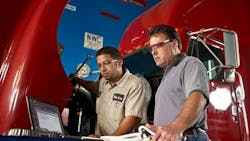While Digital Freight Matching (DFM) companies use digital platforms to match a shipper’s freight with available carrier capacity to better utilize motor carrier capacity, the industry is too complex to become an Uber type of business.
One of the key components of Uber’s model is the commodity-like nature of the ride-hailing service, explains Armstrong & Associates, who released a new report, "Digital Freight Matching – Capturing Technology-Based Efficiencies in the Trucking Industry.”
A&A’s analysis shows the principle behind DFM may be simple, but the trucking industry is not. ”Domestic transportation is not a simple commodity,” Armstrong said.” Complexities arise in the form of specialized equipment types, shipments transported via multiple modes, and necessary exception handling for service issues such as equipment breakdowns. Shipments are high-value and time sensitive. Placing an Uber-like app atop a complex industry doesn’t truly address the problem. Shippers and carriers alike will be disappointed if this is the extent of the ‘solution.’”
DFM apps do however include some of the functionality popularized by Uber – algorithmic pricing, API map integration, track-and-trace, and mobile transactions – along with features specific to trucking, such as trip planning, digital document storage, and TMS integration. But it does account for nuances in the trucking industry.
Material Handling & Logistics is an IndustryWeek companion site within Penton's Manufacturing & Supply Chain Group.
About the Author
MH&L Staff
Find contact information for the Material Handling & Logistics staff: Contact Material Handling & Logistics.
